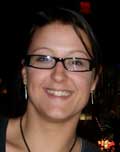Katherine’s IELTS Writing score jumped from Band 7 to 8.5 in two weeks – here’s how.
Katherine M. is a lovely lady from Europe who needed a high IELTS score to get the maximum points for her visa application. She isn’t a typical IELTS test taker because English is her mother tongue, yet after two IELTS exams Katherine saw that her Writing score remains stuck at Band 7, despite straight 9’s in Listening, Reading and Speaking. Unfortunate? Yes. Unfixable? No!
Being the smart lady that she is, Katherine decided to seek help because it was clear that excellent command of English alone isn’t enough to get her Band 8 in writing. The first two exams she went into without preparation, but the third one she wasn’t taking any chances with. Here is what Katherine says about her third (and last!) IELTS exam:

This time, I would revise, I would learn how to pass this exam, I clearly needed to know the structure and how to avoid pitfalls. Simone Braverman’s third edition of “Ace the IELTS: How to maximise your score” helped me immensely and assisted in my transition from a Band 7 to an 8.5 in the writing section.
Thanks to simple practical guidelines, this book will help you breakdown the different types of writing questions asked. This is key to knowing how to answer in the format expected by the IELTS examiners. In just a few days, through great tips and strategies, varied scenarios, ‘smart’ words and some basic connecting structures; and with the help of concrete examples, full IELTS-like practice test and many links to web-based tests, you will most definitely improve.
Tips for both the Listening and Reading tests are very useful and will help you reach a Band 7 should you apply them through practice. The speaking section is very complete in terms of examples and scenarios although difficult for me to assess as I have no need to work on this area.
In my opinion, it intended more for lower-level English speakers. The English used is simple and the grammatical variation and sentence structure could be more complex; equally, more emphasis could be placed on the ever-so important connecting words. For me, it was an essential stepping stone to more complex publications that took me over the Band 8 level. And should you be aiming at a high Band score, it should not be used alone.
However, it rapidly builds confidence, is easy to read, is well structured and provides pocket tips that helps summarise all the essentials. Importantly, it is also affordable as there are many very expensive options out there and is therefore, a great starting point.
I used IELTS Success Formula to deepen my knowledge and undoubtedly, that is what put my band score at 8.5 along with the IELTS-Blog advice and that found on IELTS Liz.com whom I also found very helpful.
Good luck to all, this exam can be conquered, that is for sure!”
Stay tuned, as we are going to share Katherine’s notes on how to write high-scoring IELTS essays and letters soon.


